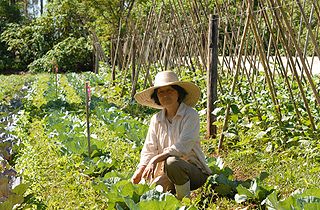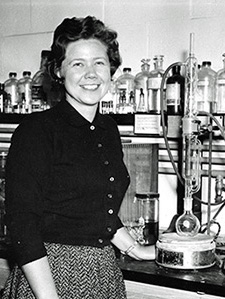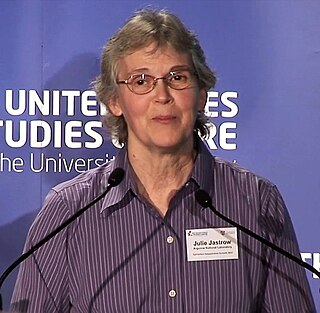Related Research Articles
Simon Asher Levin is an American ecologist and the James S. McDonnell Distinguished University Professor in Ecology and Evolutionary Biology and the director of the Center for BioComplexity at Princeton University. He specializes in using mathematical modeling and empirical studies in the understanding of macroscopic patterns of ecosystems and biological diversities.

A nutrient cycle is the movement and exchange of inorganic and organic matter back into the production of matter. Energy flow is a unidirectional and noncyclic pathway, whereas the movement of mineral nutrients is cyclic. Mineral cycles include the carbon cycle, sulfur cycle, nitrogen cycle, water cycle, phosphorus cycle, oxygen cycle, among others that continually recycle along with other mineral nutrients into productive ecological nutrition.

Diana Harrison Wall was an American environmental scientist and soil ecologist. She was the founding director of the School of Global Environmental Sustainability, a distinguished biology professor, and senior research scientist at the Natural Resource Ecology Laboratory at Colorado State University. Wall investigated ecosystem processes, soil biodiversity and ecosystem services. Her research focused on the Antarctic McMurdo Dry Valleys and its Wall Valley was named after her. Wall was a globally recognized leader and speaker on life in Antarctica and climate change.
Nancy B. Grimm is an American ecosystem ecologist and professor at Arizona State University. Grimm's substantial contributions to the understanding of urban and arid ecosystem biogeochemistry are recognized in her numerous awards. Grimm is an elected Fellow of the American Geophysical Union, Ecological Society of America, and the American Association for the Advancement of Science.
Zoe G. Cardon is an American ecosystems ecologist focused on observing and understanding ecosystem interactions in the rhizosphere. She has also played an integral role in developing systems to better study the rhizosphere without digging it up and interfering with the ecosystems using stable isotopes and mathematical modeling. Cardon is currently a senior scientist at the Marine Biology Laboratory at the Ecosystems Center and an adjunct professor of ecology and evolutionary biology at Brown University. She is credited with helping to establish the National Microbiome Initiative at the White House Office of Science and Technology Policy in Washington, D.C.
Ingrid C. "Indy" Burke is the Carl W. Knobloch, Jr. Dean at the Yale School of Forestry & Environmental Studies. She is the first female dean in the school's 116 year history. Her area of research is ecosystem ecology with a primary focus on carbon cycling and nitrogen cycling in semi-arid rangeland ecosystems. She teaches on subjects relating to ecosystem ecology, and biogeochemistry.

Jean H. Langenheim was an American plant ecologist and ethnobotanist, highly respected as an eminent scholar and a pioneer for women in the field. She has done field research in arctic, tropical, and alpine environments across five continents, with interdisciplinary research that spans across the fields of chemistry, geology, and botany. Her early research helped determine the plant origins of amber and led to her career-long work investigating the chemical ecology of resin-producing trees, including the role of plant resins for plant defense and the evolution of several resin-producing trees in the tropics. She wrote what is regarded as the authoritative reference on the topic: Plant Resins: Chemistry, Evolution, Ecology, and Ethnobotany, published in 2003.
Nancy Collins Johnson is an American earth scientist who is the Regents’ Professor and Director of the School of Earth Sciences & Environmental Sustainability at Northern Arizona University. Her work considers soil microbial ecology and the study of mycorrhizal fungi. She was elected a Fellow of the American Association for the Advancement of Science in 2020.
Priyanga Amarasekare is a Professor of Ecology and Evolutionary Biology at the University of California, Los Angeles (UCLA) and distinguished Fellow of the Ecological Society of America (ESA). Her research is in the fields of mathematical biology and trophic ecology, with a focus on understanding patterns of biodiversity, species dispersal and the impacts of climate change. She received a 2021 Guggenheim Fellowship and received ESA's Robert H. MacArthur Award in 2022.
Tadashi Fukami is an associate Professor of Biology and community ecologist at Stanford University. He is currently the head of Fukami Lab which is a community ecology research group that focuses on "historical contingency in the assembly of ecological communities." Fukami is an elected Fellow of the Ecological Society of America.

Jayne Belnap is an American soil ecologist. Her expertise lies in desert ecologies and grassland ecosystems.
Katharine Nash Suding is an American plant ecologist. Suding is a Distinguished Professor of ecology and evolutionary biology at the University of Colorado Boulder and a 2020 Professor of Distinction in the College of Arts and Sciences.
Liza Sheera Comita is an American ecologist and Professor of Tropical Forest Ecology in the School of the Environment at Yale University. Her research focuses on tropical tree species ecology and how spatial and temporal variation in early life-stages affects abundance and diversity of species in tropical forests.

Julie Dierstein Jastrow is an American terrestrial ecologist who works at the Argonne National Laboratory. Her research considers soil and ecosystems ecology. She was elected Fellow of the American Association for the Advancement of Science in 2021.
Jennifer Dunne is an American ecologist whose research focuses on the network structure of food webs. One of 14 scientists who led critical advances in food web research over the last century, according to the journal Food Webs, Dunne uses ecological network research to compare the varying ways humans interact with other species through space and time, providing a quantitative perspective on sustainability of socio-ecological systems.
Stacy Philpott is an American ecologist who is a professor at the University of California, Santa Cruz. Her research considers agroecology and the conservation of biodiversity. She was elected a Fellow of the Ecological Society of America in 2021.
Joan Gardner Ehrenfeld was an American environmental scientist who was a professor at Rutgers University. Her research considered invasive species and ecology. She was elected Fellow of the American Association for the Advancement of Science in 2000.
Julie L. Lockwood is an American ecologist who is a professor in the Department of Ecology, Evolution, and Natural Resources at Rutgers University. She is the Director of the Institute of Earth, Ocean, and Atmospheric Sciences. Her research investigates how invasive species impact natural ecosystems. In 2022, she was elected a Fellow of the American Association for the Advancement of Science.
Bridget Emmett is a British ecologist, Professor and Science Area Head for the UK Centre for Ecology & Hydrology. She is the President of British Ecological Society from 2024.
Hannah Buckley is a New Zealand ecologist, and is a full professor in the school of science at the Auckland University of Technology, specialising in biological variation in community ecological diversity through time and space.
References
- ↑ "Serita Frey". College of Life Sciences and Agriculture. 2017-11-21. Retrieved 2022-09-18.
- ↑ "Colorado State University Student Serita Frey Receives Scholarship | News & Media Relations | Colorado State University" . Retrieved 2022-09-18.
- ↑ Frey, Serita D. (1992). "Genetic relatedness and competition between strains of rhizobium leguminosarum biovar phaseoli".
- ↑ "Investigating soil microbes' role in carbon cycle". EurekAlert!. Retrieved 2022-09-18.
- ↑ "Harvard Forest". harvardforest2.fas.harvard.edu. Retrieved 2022-09-18.
- ↑ Staff Writer. "UNH ecologist one of most highly cited in world". Portsmouth Herald. Retrieved 2022-09-18.
- ↑ "Meet Serita Frey – The Ecological Society of America" . Retrieved 2022-09-18.
- ↑ "Serita D. Frey". Awards | University of New Hampshire. 2018-11-27. Retrieved 2022-09-18.
- ↑ "Frey Fellow". UNH Today. 2020-11-24. Retrieved 2022-09-18.
- ↑ "Serita Frey Named Ecological Society of America Fellow – The Ecological Society of America". April 17, 2020. Retrieved 2022-09-18.
- ↑ "Serita Frey Named Ecological Society of America Fellow". UNH Today. 2020-04-15. Retrieved 2022-09-18.